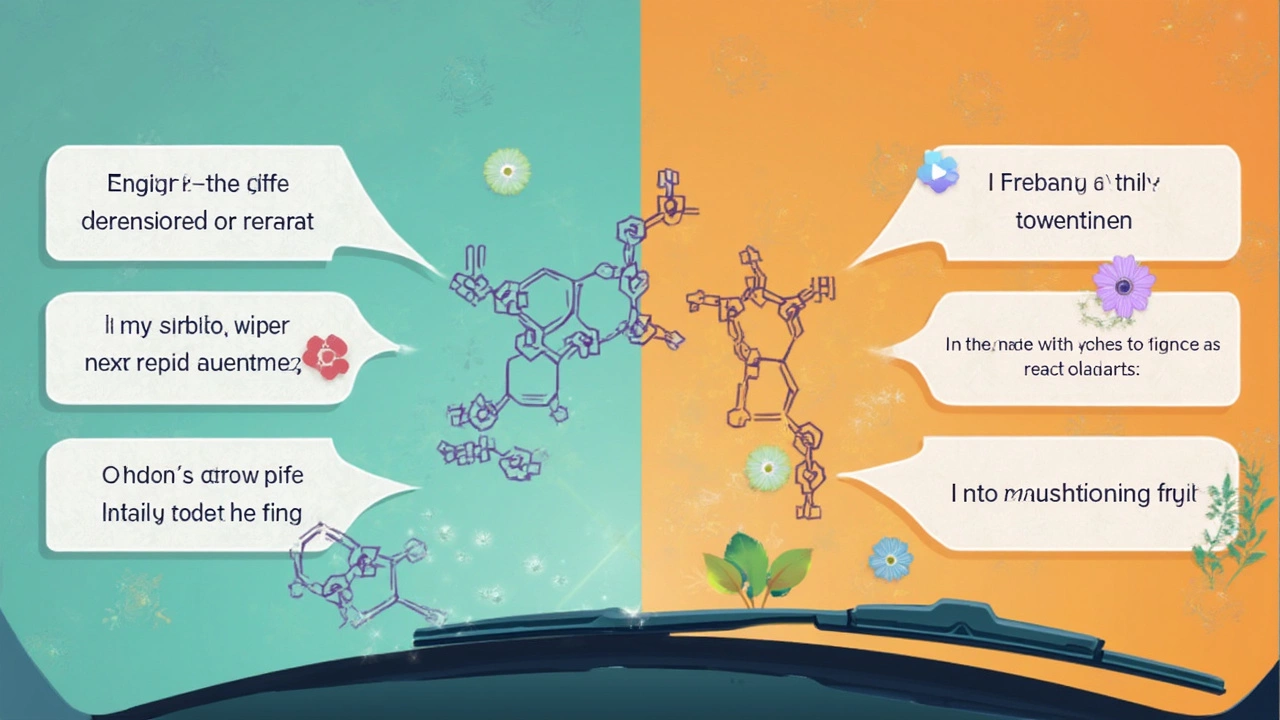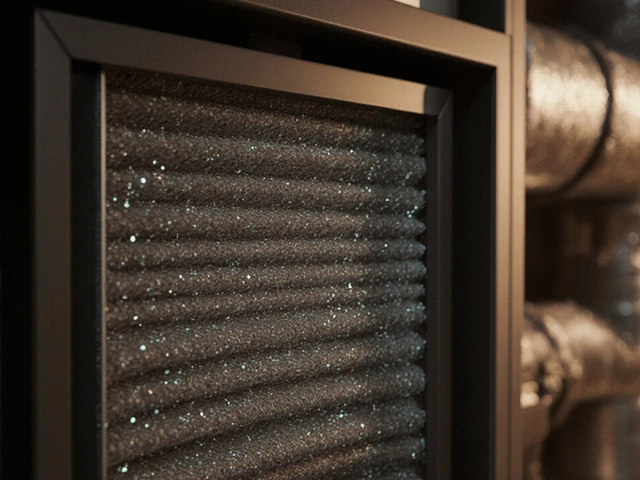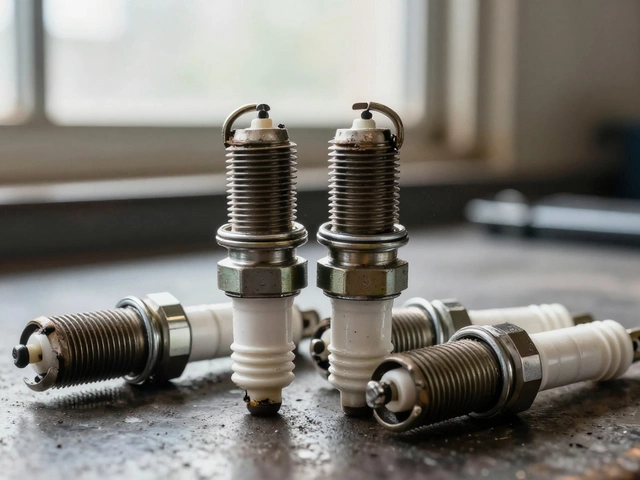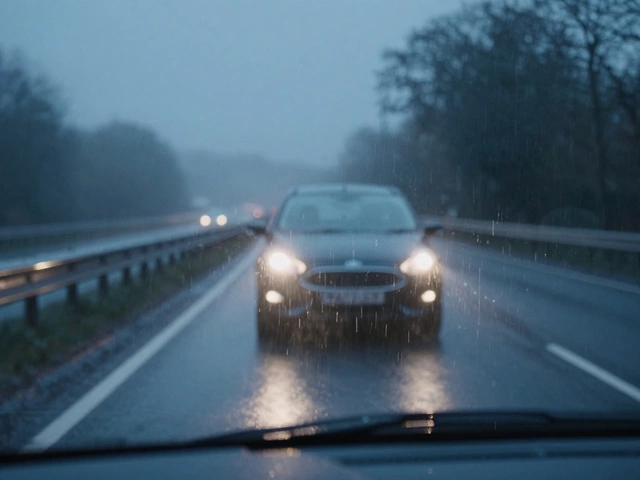
We've all been there—an empty windshield washer fluid reservoir, a dirty windshield, and a bottle of Windex in the garage. The question is, can you just pour Windex in there and call it a day?
It's not an uncommon thought. Windex is known for its streak-free shine on glass surfaces at home. Plus, it's within reach, unlike that barely-there bottle of wiper fluid. However, before you go ahead and use Windex in your car, let's break down why it might not be the best idea.
For starters, the formulations of Windex and windshield wiper fluid are quite different. Wiper fluid not only cleans; it also has other properties to help it work properly in a car environment—like preventing freezing, aiding in insect removal, and more. And no, Windex doesn't cover all those bases.
So why is that a big deal? If Windex freezes on your windshield, it can impair visibility and cause problems with your vehicle's cleaning system. Plus, some ingredients might not play nice with your car's paint or the rubber of the wipers.
- What’s in Windex?
- Windshield Wiper Fluid Basics
- The Risks of Using Windex
- Safer Alternatives for Your Windshield
- Tips for Maintaining Clear Windshields
What’s in Windex?
Windex, the go-to glass cleaner we all know and love, has a formulation specifically designed for household use. It’s great for making windows squeaky clean and shiny, but what exactly does it contain?
One of the main ingredients in Windex is ammonia. Ammonia is fantastic for removing grime and grease from your home’s glass surfaces. It's what gives Windex its distinctive smell. However, in a car setting, ammonia might not be the best for a windshield, as it can damage tinted windows and weaken rubber seals over time.
Other Key Ingredients
Besides ammonia, Windex includes a mix of detergents, dyes, and fragrances. These detergents cut through the dirt effectively, but the problem is they may not be tough enough for road grime or bugs that wiper fluid is designed to handle.
The dyes and fragrances in Windex don’t really serve a cleaning purpose but make it pleasant to use in your home. In the car world, though, they’re not offering much except for aesthetics, which isn’t a priority when cleaning windshields.
What about the weather? Standard windshield wiper fluid has antifreeze properties to deal with colder temperatures. Unfortunately, you won’t find these ingredients in Windex, since indoor uses don’t require it.
Considering the above, even though Windex is a champ at home, it doesn’t quite meet an automobile’s demanding requirements. You can keep it for your windows at home, but when it comes to your car, there are better options designed specifically for the job.
Windshield Wiper Fluid Basics
So, what's the big deal with windshield wiper fluid, and why can't we just swap it out for something like Windex? Let’s break it down.
What’s Inside?
Windshield wiper fluid isn't just colored water. It's a mix designed for very specific tasks. The fluid usually contains water, methanol, detergents, and other additives to help clean your windshield without streaks. Methanol, a key ingredient, helps prevent freezing. That's why your fluid doesn't turn into a block of ice overnight in the winter.
Why It's Important
The formulation of wiper fluid includes properties that break down grime, bugs, and other debris, ensuring clear visibility. It also aids the rubber blades of the wipers to slide smoothly across the glass, reducing wear and tear. Try getting a stubborn bug off with just water – you'll see why these additives are critical!
The Seasons Matter
Depending on where you live, you might need different types of wiper fluid for winter or summer. Summer blends often focus on insect and grime removal, while winter formulas resist freezing and might include stronger additives. Some folks even use all-season varieties to avoid swapping out twice a year.
Essential for Car Health
Aside from keeping your windshield spotless, using the right fluid also takes care of your car parts. Ingredients in wiper fluid are tested to be safe on vehicle paint, plastics, and rubber elements. Windex might not provide this same protection. Using the right fluid can prevent unexpected damage and maintain your car's health in the long run.
| Type | Freezing Point | Use Case |
|---|---|---|
| Summer Blend | -2°C | Bug and grime removal |
| Winter Blend | -30°C | Freeze resistance |
| All-Season | -20°C | Versatile purpose |
Choosing the right wiper fluid might seem trivial, but next time you're on the road in a downpour, you'll appreciate that you're using the right stuff designed to keep your vision clear and safe.

The Risks of Using Windex
Using Windex as a substitute for windshield wiper fluid might sound like an easy solution, but it's filled with potential issues that could lead to more harm than good. Let's dig deeper into some of these risks.
1. Freezing Hazard
Ordinary windshield wiper fluid is formulated to withstand extreme temperatures. It's not just about cleaning your windshield; it also has antifreeze properties to prevent freezing in cold weather. Windex, on the other hand, isn't designed for these conditions. When temperatures dip, Windex can freeze in the lines, creating a slush that blocks the system and reduces visibility. Not exactly fun when you're already dealing with icy roads!
2. Damage to Vehicle Parts
Another thing to consider is how Windex's ingredients interact with your car. Ammonia, a common component in many glass cleaners like Windex, isn’t friendly to car paint or rubber. Over time, using a fluid not meant for automotive use can cause the rubber wiper blades to degrade and could potentially harm the paint finish. You don’t want small savings to turn into big repair bills.
3. Streaking and Visibility Issues
Streaking is another issue when using household glass cleaners in place of windshield wiper fluid. Windex might leave streaks that impair visibility, especially when contaminants like dirt and bugs are thrown into the mix. The chemical formulation of typical wiper fluid is designed specifically to handle the grime that comes from everyday driving, not just achieve shine.
4. Potential Chemical Reaction
Ever thought about chemical reactions? Regular windshield wiper fluid is specifically blended to prevent unusual reactions between fluids and car materials. Windex could react differently with materials it wasn’t intended to touch, causing unexpected wear and tear.
- Freezing of fluid lines
- Damage to rubber components and car paint
- Visibility issues due to streaking
- Potential chemical reactions affecting vehicle function
In short, while Windex excels at cleaning glass surfaces in the home, treating it as a replacement for your car's windshield wiper fluid isn't advisable. Stick to products specifically designed for automotive use to avoid these headaches.
Safer Alternatives for Your Windshield
If you're thinking of more reliable options than Windex for your windshield, you're in luck. There are several products specifically designed for windshield wiper fluid that will keep your view clear and safe.
Store-Bought Fluids
Your first and safest bet is to go for a commercial windshield wiper fluid. These fluids are formulated to do more than just clean. They typically contain antifreeze for those chilly mornings and are designed to break down stubborn residue from insects and bird droppings.
"Using the right windshield wiper fluid can prevent costly damages and ensure safety," says John Anderson, a car maintenance expert in Auto Weekly.
DIY Windshield Wiper Fluid
If you're a DIY fan, you can make your fluid at home. Here's a simple recipe:
- Mix 3 cups of distilled water with 1 cup of white vinegar. The vinegar helps cut through grime.
- Add a few drops of dish soap. Avoid too much soap to prevent excessive suds.
- Optionally, add a few drops of food coloring to help track fluid levels easily. Just make sure it's not toxic.
Store it in a clean, empty wiper fluid container and you’re good to go!
Eco-Friendly Options
Being kind to the environment is easier with eco-friendly windshield fluids available in stores. These are often made from biodegradable materials and don’t contain harsh chemicals that can harm the environment.
Moreover, keeping your windshield clean isn't just about the fluid. Make sure your windscreen wipers are in good condition and not leaving streaks. Regular maintenance checks can save you from streaky surprises during a drive!

Tips for Maintaining Clear Windshields
Keeping your windshield clear is more crucial than you might think. Not only does it improve visibility, but it's also a key part of regular car maintenance. Here are some practical tips to ensure your windshield stays in tip-top shape.
Regular Cleaning
Sounds simple, but a little soap and water go a long way. Use a soft microfiber cloth to avoid any scratches. If you've got a bug problem, try a specialized cleaner designed to dissolve insect residue.
Choose the Right Wiper Fluid
Resist the urge to substitute with items like Windex. Go for a proper windshield wiper fluid that’s formulated for automotive use. These fluids help remove debris and usually include antifreeze agents.
Check and Replace Wiper Blades
Funny as it sounds, worn-out wipers can lead to a smeared mess rather than a clean shine. Check them every few months for cracks or stiffness. If they’re not doing their job right, time for a switch.
Maintain Your Washer Nozzles
Clogged nozzles won't spray the fluid properly. If you notice a weak spray or no spray at all, it’s worth giving them a clean. A small needle can usually do the trick. Carefully unclog anything stuck in there.
Inspect for Damage
Small chips or cracks can turn nasty if neglected. They can impair visibility and even spread under temperature changes. Most auto glass shops can fix a chip quickly before it becomes a big deal.
Weather Precautions
| Season | Tip |
|---|---|
| Winter | Use fluid formulated to withstand freezing temperatures. |
| Summer | Top off your fluid often as it gets used more frequently. |
Regular care keeps your windshield crystal clear and you safer on the road. Got more tips? Share them with us!





